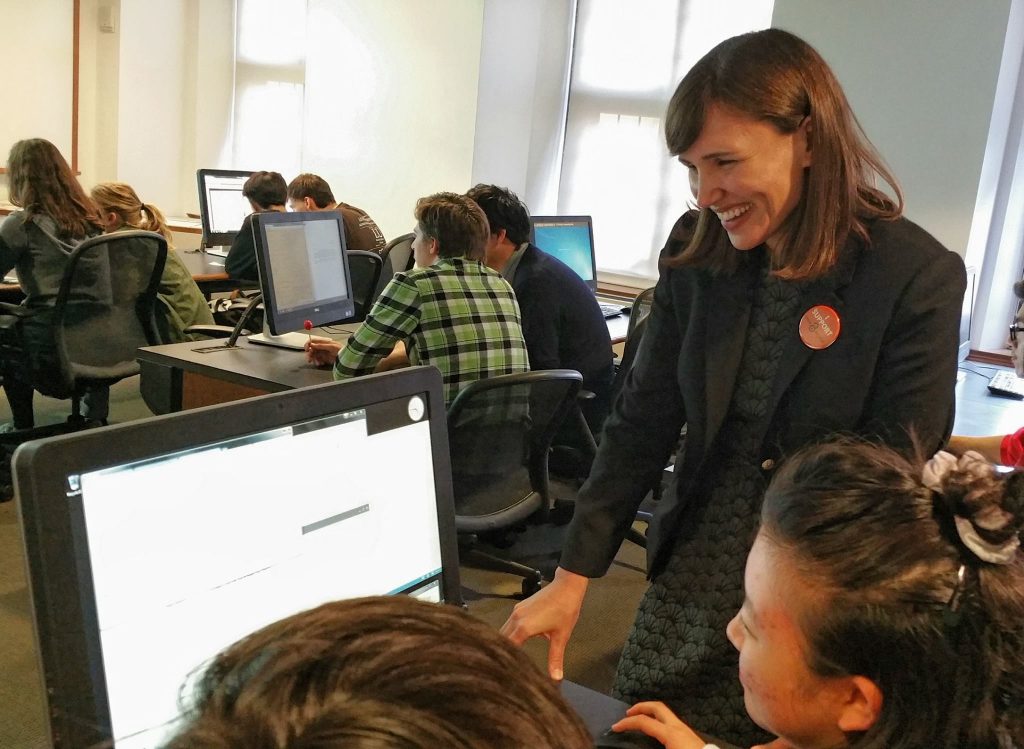Unlike most graduate students, when I started my history PhD at the University of Southern California, I knew I did not want to be a professor. Fresh out of the public humanities program at Brown, I was inspired by the work of public historians like Steven Lubar and Richard Rabinowitz. I figured I would go on and get a PhD, like they had, and then find a curatorial job in a history museum. Not even a semester into my first year, however, my plan began to change (although I didn’t quite realize it at the time). I entered USC intent on studying historical memory, but I soon realized that my true passion was the history of the book. And, instead of pursuing internships in the museum world, I began working for one of my professors, Phil Ethington, on a variety of digital humanities (DH) projects.

Annie Johnson with students at Lehigh University. Credit: Stacey Kimmel-Smith
At the time, however, there really wasn’t much enthusiasm for DH within my department or in the library. I had to take the initiative myself. I joined Twitter and became a HASTAC Scholar (a fellowship program that connects students interested in transformative teaching and learning). I attended THATCamp (an informal conference for humanists and technologists) and other DH events that seemed intriguing to me, whether they were in California or across the country. I got involved with the DH community in these ways not because I thought it would lead to a job, but because I believed that DH had the potential to build bridges between academia and the public, and that excited me.
By the end of my fourth year, I started to think seriously about what I wanted to do next. I was lucky in that my adviser, Karen Halttunen, was very supportive of my desire to pursue a career outside of the tenure track, even though I still wasn’t sure what such a career would look like. It was during an informational interview with two PhDs turned librarians that I first learned about the Council on Library and Information Resources (CLIR) Postdoctoral Fellowship Program. The CLIR program places recent PhDs in academic libraries. More like an apprenticeship than a traditional postdoc, it seemed like the perfect fit for a book historian/digital humanist like myself.
I ended up as a CLIR Fellow at Lehigh University, which hired me to support digital scholarship and open access initiatives on campus. I used the opportunity to learn as much as I could about the many different aspects of academic librarianship. Working in a library is certainly not the same as doing research in a library (something all graduate students are all too familiar with), but I enjoyed my new role from the start. In particular, I loved feeling like my work was contributing to a larger conversation about the role of books and libraries in a digital age.
After my postdoc, I accepted a job as the library publishing and scholarly communications specialist at Temple University. It’s a brand new, joint position between Temple University Libraries and Temple University Press. My dissertation examined the history of scholarly publishing in 19th-century America. Now, I get to help shape the future of scholarly publishing. My work is exciting, challenging, and no day is exactly the same. Currently, I’m helping to launch a new open access undergraduate research journal, collaborating with a faculty member on a digital companion to his print book, and writing a grant proposal to digitize and make freely available some of our out-of-print press books. I have still found time to pursue my own research, although these days, I am more interested in writing about our present moment than I am about the past.
Graduate school teaches us to be hypercritical of our work and our worth. But anyone who finishes a dissertation has to be creative, hard-working, and self-directed. These are skills that are highly valued by employers in all industries. So, whether you always knew that you weren’t meant to be a professor or you’re just coming to terms with the idea, try not to worry too much about following any one specific path. I have a job that allows me to draw on my background in public humanities, the history of the book, digital scholarship, and scholarly publishing. However, my job did not exist when I was in graduate school, and there’s really no way I could have planned for it. To be honest, this thought probably would have driven my graduate student self crazy. Now, I can’t even imagine anything different.
Annie Johnson is the library publishing and scholarly communications specialist at Temple University. She received a PhD in American history from the University of Southern California in 2014. Find her on Twitter @anniekjohn.
The Council on Library and Information Resources (CLIR) recognizes the radical changes taking place in the information landscape that require new roles for libraries within the academy. The 2016 cohort of CLIR postdoctoral fellows includes two AHA members: Heather Wacha, PhD in medieval history from the University of Iowa; and Jeffrey Wayno, PhD in history from Columbia University. Both will begin postdoctoral fellowships through the Data Curation for Medieval Studies program.
This post first appeared on AHA Today.
Tags: AHA Today Career Diversity for Historians Resources for Early Career Resources for Graduate Students Graduate Education
Comment
Please read our commenting and letters policy before submitting.






